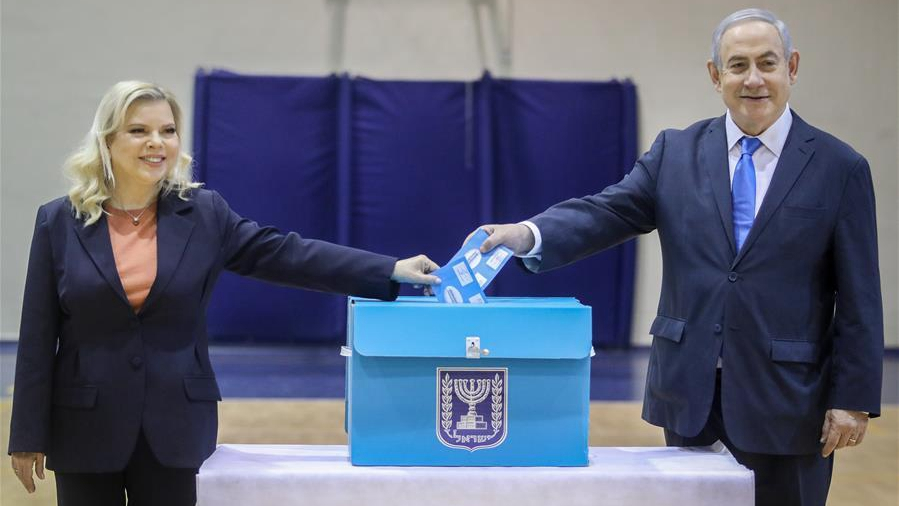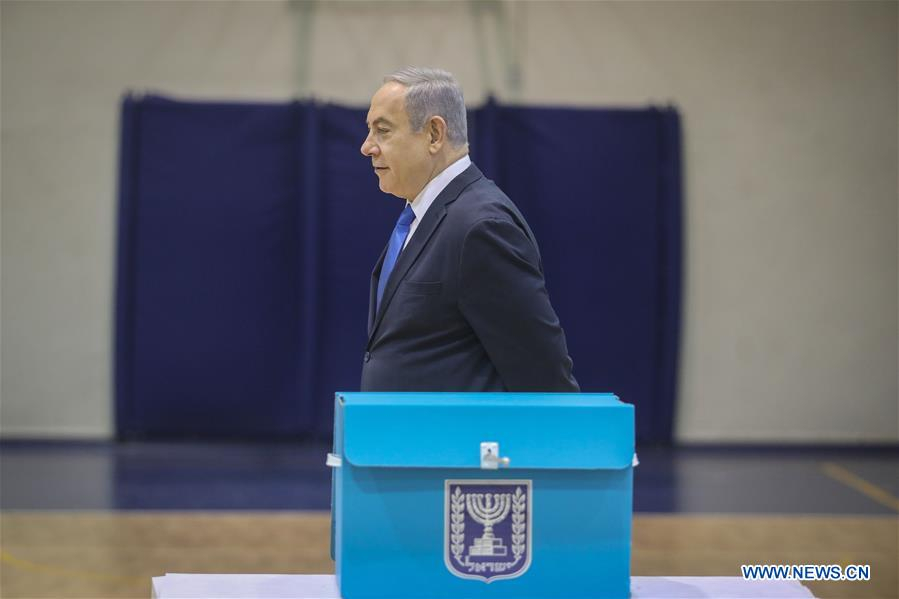
Israeli Prime Minister Benjamin Netanyahu and his wife Sara vote at a polling station in Jerusalem, March 2, 2020. /Xinhua
Israeli Prime Minister Benjamin Netanyahu and his wife Sara vote at a polling station in Jerusalem, March 2, 2020. /Xinhua
Editor's note: Hannan Hussain is a security analyst at the South Asia Center, London School of Economics, and an author. The article reflects the author's opinions, not necessarily the views of CGTN.
Between a seemingly endless political deadlock and a third round of voting, Israeli Prime Minister Benjamin Netanyahu's desperation to retain power appears most pronounced. With 37 seats in the exit polls, the Likud took the lead against its main rival Blue and White party, which gained 32 seats, led by Benny Gantz, Netanyahu's chief rival.
The absence of a majority coalition has lent further ammunition to Gantz, who wishes to underscore the latter's 14-year rule as increasingly divisive. Strong voting momentum among the Joint List, a tight alliance of Arab-majority political parties, is also adding to Netanyahu's newfound resistance. It enjoys nearly one-fifth of voter share across the national electorate, enough to tip the scales against Netanyahu if push comes to shove.
Hence, breaking another deadlock would require Netanyahu to do what he fears most: lead the charge on consensus-building.
A clinical test of Netanyahu's consensus-building
Gantz's penetration into Netanyahu's voter base and the strengthening of the Israeli-Palestinian vote suggests that the Israeli premier's strongman posturing won't cut it for long.
There is little chance that today's vote would break Israel's post-election deadlock to the benefit of Netanyahu. Gantz cannot muster too many numbers from the far-right and the Arab-Israeli vote is set to be a reaction to Netanyahu's own vitriolic election rhetoric. Instead, he must employ an alternative metric to establish why he deserves a continuity in rule. This begins with coalition-building.
Of all the chances Netanyahu got in the first two votes, he chose to divert public attention from his consensus-building deficiencies: "Give me the power to guarantee Israel's security. Give me the power to determine Israel's borders," remarked Netanyahu during September's election week. His opponents – from both the left and the right – construed the statement as a transparent political ploy, a desperation to survive.

Benny Gantz, leader of the centrist Blue and White party, and his wife Revital Gantz vote at a polling station in Rosh Haayin, Israel, March 2, 2020. /Xinhua
Benny Gantz, leader of the centrist Blue and White party, and his wife Revital Gantz vote at a polling station in Rosh Haayin, Israel, March 2, 2020. /Xinhua
Netanyahu's digressions were also instrumental in empowering the Arab-Israeli vote. It grew from 50 percent in April's elections to an estimated 60 percent last September.
The Joint List plays a very integral role in the third round. First, the political alliance has no stated allegiance with either Likud or the Blue and White. In fact, it is on record challenging both. This weakens the chances of an Arab-Israeli vote pivoting towards Gantz or Netanyahu.
Second, Netanyahu has campaigned relentlessly to denounce Joint List's legitimacy, and thus compounds his chances to form a right-wing coalition with their prospective numbers. He is on record claiming that the Arab alliance is an effort to "annihilate Israeli men, women and children," and has routinely rejected possibilities of sharing any political space.
Meanwhile, Joint List leader Odeh has promised a high turnout in today's polling, with the stated purpose of blocking Netanyahu from forming any coalition.
Gantz emerges as the greatest beneficiary of this friction. He may have refused a coalition with the Joint List, but desperately needs Arab support to eclipse Netanyahu. Executing the latter requires the consent of Avigdor Liberman, whose support has proven historically decisive, but is always conditioned upon a Jews-only government.
Forming a government under indictment, let alone sustaining it, is without precedent in Israel. In November, Netanyahu was charged with bribery, fraud and breach of trust, pertaining to three distinct cases. He chose to dismiss all charges as a witch-hunt, and has denied ever since.
Even if the Israeli premier manages to lead a coalition, his formal indictment would commence two-weeks after. It threatens to hang over his head until some semblance of accountability prevails. Netanyahu hasn't stressed any form of accountability yet.
His most vocal critics, led by Gantz, have lobbied hard to make this point and argue that Netanyahu's re-election is a well-thought diversion. "If an indictment is filed against me while serving as prime minister, I won't continue in my position," asserted Gantz in his build-up to Monday's polls.
Netanyahu stands little chance to develop a lasting consensus if he continues to override political rifts and sidestep justice.

Benjamin Netanyahu after voting at a polling station in Jerusalem, March 2, 2020. /Xinhua
Benjamin Netanyahu after voting at a polling station in Jerusalem, March 2, 2020. /Xinhua
Role of the Middle East Peace Plan
Today's vote is the first ever since the announcement of the Trump administration's Middle East Peace Plan. Thus, Israel's electoral behavior in wake of the strategy remains vastly unexplored.
The most important factor to consider is that the plan was subject to outright rejection by Palestinians, and by extension, Arab-Israeli voters. "Trump's deal is not a peace plan because peace is built on justice. I'll vote to prevent the right wing from gaining power," said one voter on the eve of the polls.
Moreover, Netanyahu has demonstrated an over reliance on the Middle East Peace Plan in a bid to market it as domestic leverage. No tangible gain has surfaced.
Instead, the plan (and its timing) failed to facilitate Netanyahu's electoral prospects, which ended up in a longer deadlock. This calls for a revision of the idea that Washington's geopolitical ties with Tel Aviv would automatically ensure respite for one continuous Israeli leader.
The Trump administration appears determined to deliver Israel control over illegal settlements. But its desire to use the Peace Plan to the benefit of Netanyahu's electoral maneuvering, is purely speculative.
For Gantz, appealing to the sensitivities of Israeli-Arab voters requires a reversal in his primary position: to build a coalition only with a Jewish majority, and not with the Joint List. Second, the integration of Arabs into a prospective coalition means moderating many anti-Palestine sub-groups within his own "secular alliance."
Its secular identity is forged as a reaction to Netanyahu's right-wing politics, and not as an arrangement designed to integrate progressive Arab factions, or transform Israel's deeply fractured political landscape.
(If you want to contribute and have specific expertise, please contact us at opinions@cgtn.com.)